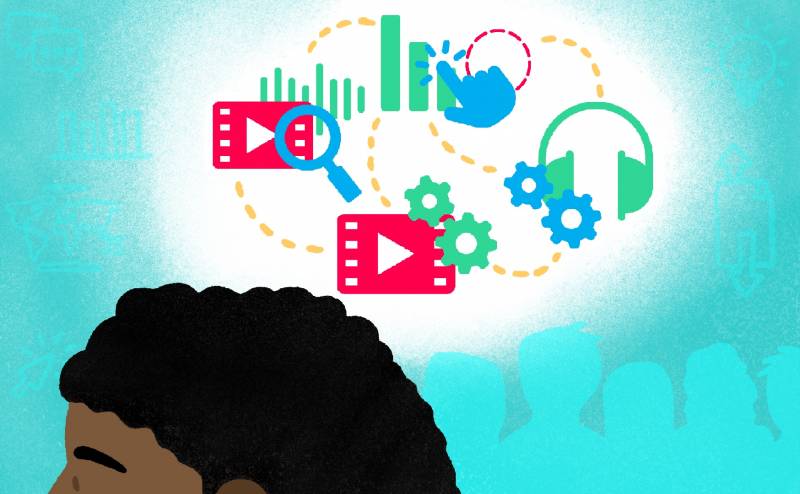Registration is now open for the KQED Media Academy for Educators.
The new KQED Media Academy for Educators is a comprehensive sequence of four free, instructor-led online courses that prepare educators to engage students through media making while also supporting curriculum goals. Delivered via the award-winning KQED Teach professional development platform, these courses are designed to provide a clear and achievable pathway to PBS Media Literacy Educator Certification. The certification consists of eight core competencies that form the foundation for a successful 21st century learning environment, in which the development of student media literacy and digital citizenship are clear requirements.
True learning happens through a cycle of making and sharing, and giving and receiving feedback.
The first KQED Media Academy course, Video Production for the Classroom, will begin June 8. All courses are offered on a regular schedule and are led by experienced KQED Education staff and members of our amazing teacher community who will provide mentorship and constructive feedback on assignments throughout the course to help move you to mastery. These courses employ a “learn-by-doing” pedagogy that focuses on making and sharing media, to both demonstrate the learning of individual skills and mirror the steps students will engage in when creating and sharing their own media. We believe that, as it is with the students you serve, learning isn’t signified simply by the dissemination of knowledge. True learning happens through a cycle of making and sharing, and giving and receiving feedback. This emphasis on the “educator as media maker” permeates all KQED Teach courses. Participants, through the work they share, the feedback they provide to others and the conversations they engage in, actively shape the course text and contribute to the learning of the entire community.
In addition to the professional learning benefits, participants who complete the course requirements will earn a Certificate of Completion indicating the number of professional learning hours associated with each course (typically 20-40 hours). All course assignments are structured to give participants experience with the eight core competencies of the PBS Media Literacy Educator Certification, which is earned by completing eight micro-credentials. By successfully completing these assignments, participants will have developed the artifacts and insights needed to apply for micro-credentials.
This student engagement strategy shifts the focus to communication literacies and the production of meaningful content—and away from a digital tools focus that often substitutes flash for substance.
KQED is a nonprofit, public media station with more than 60 years’ experience in education. We regularly see the positive impact of student media making as a pathway to student engagement and the necessary media literacy skills that will serve them throughout their lives as both consumers and producers of media. We support teachers in understanding the ways that storytelling—across a variety of media and in all subject areas—can help students approach complex topics more easily, effectively demonstrate their mastery of standards and acquire critical media literacy skills. This student engagement strategy shifts the focus to communication literacies and the production of meaningful content—and away from a digital tools focus that often substitutes flash for substance. And, of course, storytelling with media addresses many writing, reading, speaking and listening skills required by both the Common Core State Standards (CCSS) and Next Generation Science Standards (NGSS) and it is ideally suited to project-based learning (PBL).
The KQED Media Academy is a place where educators are free to push themselves and try new things without the fear of judgement.
What makes KQED Teach different from other PD learning platforms is our focus on providing teachers with the same experiences the current standards are asking of students. Learning-by-doing, producing for an audience, sharing work publicly, and giving and receiving feedback are all essential components of 21st century learning. We want teachers to experience the things we often ask students to do without a second thought, like learn new media-making skills and take the emotional risk of publicly sharing personal work. We also understand the discomfort some educators might feel about being an adult who is new to digital media literacy. As with the rest of KQED Teach, the KQED Media Academy is a place where educators are free to push themselves and try new things without the fear of judgement. Our courses provide a safe, fun and social online learning environment with making and sharing media as its foundation. We believe that focusing on the development of 21st century literacy skills for teachers leads directly to opportunities to integrate these skills into their learning environments to better engage students.
Our courses are technology agnostic. We prioritize storytelling skills and provide advice on how to make awesome media with whatever tools you have handy.
We know that sometimes educators are daunted by the wide range of classroom technology and infrastructure in their classrooms and schools. That’s why our courses are technology agnostic. We prioritize storytelling skills and provide advice on how to make awesome media with whatever tools you have handy, instead of focusing on how to use a specific piece of hardware or software. We do this by recommending software that is free or low cost and ensuring that activities can be completed on a wide range of computers or other devices that are most commonly accessible in classrooms.
